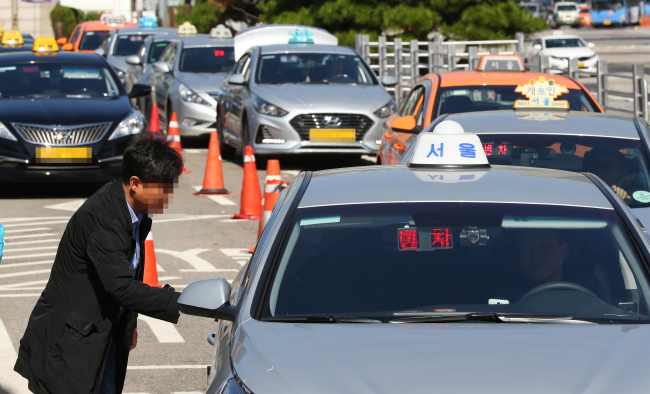Tens of thousands of taxi drivers in South Korea will suspend operation on Thursday in protest of Kakao’s plan to launch a carpool service.
The taxi drivers are expected to gather at 2 p.m. at Gwanghwamun Square in the center of Seoul to “campaign to build order in taxi operation business and fight against illegal carpooling.”
The controversy began with Kakao’s recent announcement it would launch a carpooling service by year-end to give users an alternative option of sharing rides in personal vehicles. Registered taxi drivers have fiercely protested the announcement, and after the company’s transportation arm Kakao Mobility posted a recruitment notice, taxi drivers have decided to take action against what it calls “illegal operation of personal vehicles under the pretense of car sharing.”
 |
(Yonhap) |
Seoul's some 49,250 private taxi drivers have said they will totally suspend services to participate in the protest, while taxi corporations said they would leave it up to each individual driver to halt or continue business on the day. There are about 22,600 corporate-owned taxis in Seoul.
In the capital area of Seoul, Gyeonggi Province and Incheon, additional subway trains and public buses will run during prime commuting hours and run extended hours to 2 a.m. to minimize passenger inconvenience.
Similar protest will take place on the same day in Gyeonggi Province, where the Kakao Mobility firm is located. Within Gyeonggi Province, some 11,000 out of 26,600 private taxis and 10,000 out of 10,500 corporate taxis will halt services for the day to take part in the rally.
In Incheon, of 14,400 taxis about 4,500 are expected to suspend business.
In Jeonju, North Jeolla Province, 2,340 private taxis will halt service, while 1,520 corporate taxis will let individual drivers decide whether or not to take part in the protest.
From Busan, about 1,000, or 6 percent, of taxi drivers are planning to come up to Seoul on the day. From Daegu, about 600 are traveling up to Seoul.
In other regions that have given autonomy to drivers to either participate or not participate in the protest, 320 drivers in Gwangju, 250 in Gangwon Province, 200 in South Gyeongsang Province, 160 in Ulsan and 25 on Jeju Island have said they will not operate Thursday.
In a separate development, the city of Seoul has suggested it will raise the minimum taxi fare to 4,000 won ($3.50) next year, and have nighttime surcharge hours start an hour earlier, from 11 p.m., to improve working conditions of the city’s taxi drivers.
Currently, taxi rates in Seoul by meter start from 3,000 won. Between midnight and 4 a.m., the charge goes up by 20 percent. For corporation-owned taxis, after the drivers pay their daily dues owed to their company, which range from 140,000 to 170,000 won, the net profit they take away doesn’t amount to much.
The last time the city raised taxi fares was five years ago in 2013, from 2,600 won.
By Lim Jeong-yeo (
kaylalim@heraldcorp.com)








